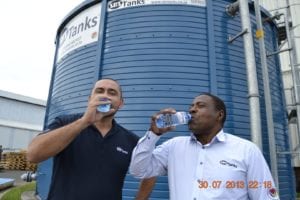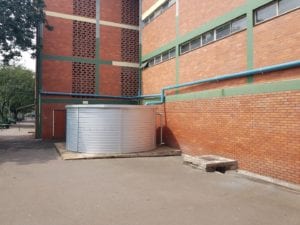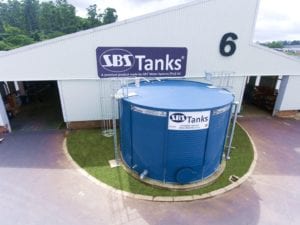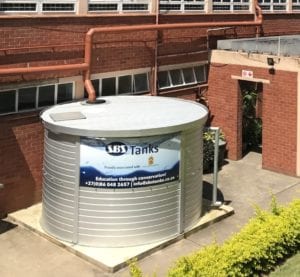Steel tank water storage systems are one of the preferred interventions making a major contribution towards maximising water security in South Africa, their use in rainwater harvesting being a prime example.
Accurate statistics are dependent on precisely recorded data; but in the case of weather forecasts, there are so many new and unpredictable variables brought about by climate change. In South Africa, extended droughts are now common in a region historically prone to progressive desertification. Since the challenges are now mostly immediate, and we can no longer depend solely on dam storage, one of the best supplementary alternatives is the installation of rainwater harvesting systems. Specialist manufacturer SBS Tanks leads in this field with a broad range of propriety solutions that include recent orders to mitigate Cape Town’s worst drought on record. SBS’ steel tanks meet the water containment needs of a wide range of industries from mining and municipal to fire protection services, agriculture and the desalination sector.
“Drought conditions experienced nationally are a serious risk to water security, but even in those areas currently not affected, other factors come into play as a result of collapsing infrastructure, resulting in extended interruptions to municipal services,” explains Mava Gwagwa, director: New Business and Key Accounts, SBS Tanks.
“This presents a strong business case for rainwater harvesting, and backup storage in general, which can alleviate the pressure on our strained water resources and help ensure sustainable supply through dry seasons. Some level of self-sufficiency is no longer optional, but a prerequisite. And even steady harvesting in low-rainfall regions can yield great results over time. For example, for every 1 mm of rain that falls on a square metre section of roof or similar hard surface run-off area, one litre of water can be harvested.”
Specialist manufacturer SBS Tanks leads in this field with a broad range of propriety solutions that include recent orders to mitigate Cape Town’s worst drought on record. SBS’ steel tanks meet the water containment needs of a wide range of industries from mining and municipal to fire protection services, agriculture and the desalination sector.
“Drought conditions experienced nationally are a serious risk to water security, but even in those areas currently not affected, other factors come into play as a result of collapsing infrastructure, resulting in extended interruptions to municipal services,” explains Mava Gwagwa, director: New Business and Key Accounts, SBS Tanks.
“This presents a strong business case for rainwater harvesting, and backup storage in general, which can alleviate the pressure on our strained water resources and help ensure sustainable supply through dry seasons. Some level of self-sufficiency is no longer optional, but a prerequisite. And even steady harvesting in low-rainfall regions can yield great results over time. For example, for every 1 mm of rain that falls on a square metre section of roof or similar hard surface run-off area, one litre of water can be harvested.”
 Showing the way
Showing the way
As a premium supplier of water storage since 1998, SBS Tanks has wanted to ‘walk the talk’. “Having spent many years providing advice to a broad range of public and private sector stakeholders, we are more aware than most of how important water autonomy is to any company. So we decided to install a rainwater harvesting system at our manufacturing and head office campus in Pinetown,” says Fabio Grendele, operations manager at SBS Tanks. The total roof catchment area at this facility is approximately 1 046 m2. With a staff complement of almost 100 people, a fleet of a dozen installation and sales vehicles, and factory premises surpassing 6 500 m2, SBS’ water requirements are considerable. Plus consistent water supply must be guaranteed to sustain business operations during periods of scheduled or unexpected municipal water supply interruptions.
SBS’ purpose-built rainwater harvesting tank, which has a gross and effective capacity of 154 kℓ and 141 kℓ, respectively, now makes the company virtually self-sufficient. Additionally, having a dedicated standby resource also caters for other scenarios like firefighting emergencies.“In the event of a power failure, which may affect the VSD pump, our tank is equipped with an automatic changeover, ensuring that, in such an event, our water supply seamlessly switches over from our rainwater supply to the municipal feed,” adds Grendele. “For an entirely off-the-grid setup, tanks can even have solar panels installed on the roof, ensuring a guaranteed supply of rainwater in the unlikely event of both electricity and water municipal feeds being disconnected.”








